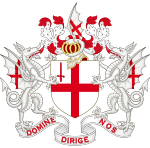City of London Corporation
|
Mayor and Commonalty and Citizens of the City of London City of London Corporation |
|
|---|---|

Arms of the Corporation of the City of London: Argent, a cross gules in the first quarter a sword in pale point upwards of the last; Supporters: Two dragons with wings elevated and addorsed argent on each wing a cross gules;
Crest: On a dragon's wing displayed sinister a cross gules; Motto: Domine Dirige Nos ("O Lord direct us") |
|

Corporation logo
|
|
| Type | |
| Type |
Local authority of the City of London
|
| Leadership | |
|
Andrew Parmley
Since 11 November 2016 |
|
|
John Barradell OBE
Since 16 September 2012 |
|
|
Policy Chairman
|
Mark Boleat
|
|
Chief Commoner
|
John Bennett
Since April 2013 |
| Structure | |
| Seats | 100 Common Councilmen 25 Aldermen |
|
Court of Aldermen political groups
|
Non-affiliated |
|
Court of Common Council political groups
|
Independent (99) Labour (1) |
| Court of Aldermen committees | Privileges Committee, General Purposes Committee |
| Court of Common Council committees | Policy & Resources Committee, Finance Committee, Investment Committee, Planning & Transportation Committee, Port Health & Environmental Services Committee, Markets Committee, Police Committee, Culture Heritage & Libraries Committee, Community & Children's Services Committee, Gresham Committee, Epping Forest & Commons Committee, Open Spaces Committee, Establishment Committee, Barbican Residential Committee, Hampstead Heath Committee, City Bridge Trust Committee, Standards Committee, Licensing Committee, Audit & Risk Management Committee, Boards: City of London School, City of London School for Girls, City of London Freemen's School, Guildhall School of Music & Drama, Barbican Centre, Museum of London |
| Elections | |
|
Court of Aldermen last election
|
Varies – individual mandate, up to 6 year term of office |
|
Court of Common Council last election
|
March 2013 – 4 year term of office |
| Meeting place | |
| Guildhall, London | |
| Website | |
| cityoflondon.gov.uk | |
The City of London Corporation, officially and legally the Mayor and Commonalty and Citizens of the City of London, is the municipal governing body of the City of London, the historic centre of London and the location of much of the UK's financial sector. In 2006 the name was changed from Corporation of London to avoid confusion with the wider London local government, the Greater London Authority.
The Corporation is probably the world's oldest continuously-elected local government authority. Both businesses and residents of the City, or "Square Mile", are entitled to vote in elections, and in addition to its functions as the local authority – analogous to those undertaken by the boroughs that administer the rest of London – it takes responsibility for supporting the financial services industry and representing its interests. The corporation's structure includes the Lord Mayor, the Court of Aldermen, the Court of Common Council, and the Freemen and Livery of the City.
In Anglo-Saxon times, consultation between the City's rulers and its citizens took place at the Folkmoot. Administration and judicial processes were conducted at the Court of Husting and the non-legal part of the court's work evolved into the Court of Aldermen.
There is no surviving record of a charter first establishing the Corporation as a legal body, but the City is regarded as incorporated by prescription, meaning that the law presumes it to have been incorporated because it has for so long been regarded as such (e.g., Magna Carta states that "the City of London shall have/enjoy its ancient liberties"). The City of London Corporation has been granted various special privileges since the Norman Conquest, and the Corporation's first recorded Royal Charter dates from around 1067, when William the Conqueror granted the citizens of London a charter confirming the rights and privileges that they had enjoyed since the time of Edward the Confessor. Numerous subsequent Royal Charters over the centuries confirmed and extended the citizens' rights.
...
Wikipedia
